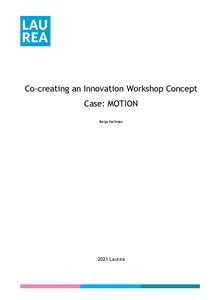Co-creating an Innovation Workshop Concept - Case: MOTION
Hellman, Reija (2021)
Avaa tiedosto
Lataukset:
Hellman, Reija
2021
All rights reserved. This publication is copyrighted. You may download, display and print it for Your own personal use. Commercial use is prohibited.
Julkaisun pysyvä osoite on
https://urn.fi/URN:NBN:fi:amk-2021120824498
https://urn.fi/URN:NBN:fi:amk-2021120824498
Tiivistelmä
The objective of this thesis is to design an innovation workshop concept that aims to innovate sustainable solutions and services in tourism by using Futures Thinking and Design Thinking. The workshop concept is designed for MOTION which is an EU-funded project addressing overtourism problems.
This practical thesis uses a constructive research and service design to approach the development task. The practical development task is executed by following a Service Design process and using different design methods and tools. The author of this thesis has the role of the designer of the workshop concept which is developed in co-creation with the MOTION project team. The theoretical framework of the thesis and the subsequent design of the workshop are grounded on the Service-Dominant Logic (SDL) framework and the theories of Design Thinking, Service Design, and Futures Thinking. The theoretical part of this thesis was written based on Finnish and international journals and publications, Service Design manuals, and expert discussions and interviews.
The outcome of the development task is a five-day innovation workshop concept basing on user (facilitator) needs and the goals of the project. The service concept was concretized as a hands-on toolkit. The purpose of the toolkit is to help the facilitators of the workshop to follow and facilitate the innovation process and the selected Futures and Design Thinking methods and tools in order to guide the participants to innovate sustainable services in tourism.
In the end, the designed innovation workshop concept can be stated to very much reflect the project goals, and user needs and wants as the concept was co-created and validated with the MOTION project team. This is because, besides the customer, the team also represent the user of the concept (facilitator) as well as the expert in the field. However, it is recommended that the workshop concept would be tested in a real environment by the real facilitators and with real participants in order to test the functionality and usability of the concept, and to develop it further.
This practical thesis uses a constructive research and service design to approach the development task. The practical development task is executed by following a Service Design process and using different design methods and tools. The author of this thesis has the role of the designer of the workshop concept which is developed in co-creation with the MOTION project team. The theoretical framework of the thesis and the subsequent design of the workshop are grounded on the Service-Dominant Logic (SDL) framework and the theories of Design Thinking, Service Design, and Futures Thinking. The theoretical part of this thesis was written based on Finnish and international journals and publications, Service Design manuals, and expert discussions and interviews.
The outcome of the development task is a five-day innovation workshop concept basing on user (facilitator) needs and the goals of the project. The service concept was concretized as a hands-on toolkit. The purpose of the toolkit is to help the facilitators of the workshop to follow and facilitate the innovation process and the selected Futures and Design Thinking methods and tools in order to guide the participants to innovate sustainable services in tourism.
In the end, the designed innovation workshop concept can be stated to very much reflect the project goals, and user needs and wants as the concept was co-created and validated with the MOTION project team. This is because, besides the customer, the team also represent the user of the concept (facilitator) as well as the expert in the field. However, it is recommended that the workshop concept would be tested in a real environment by the real facilitators and with real participants in order to test the functionality and usability of the concept, and to develop it further.
